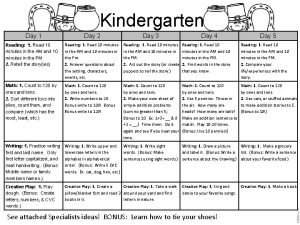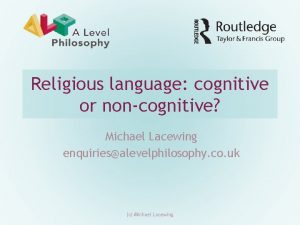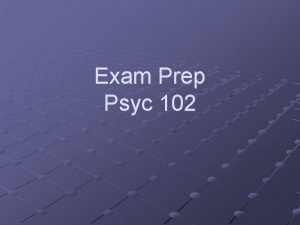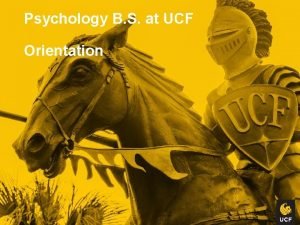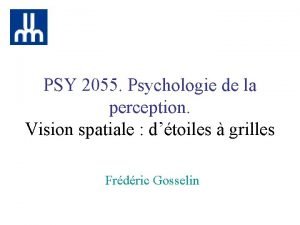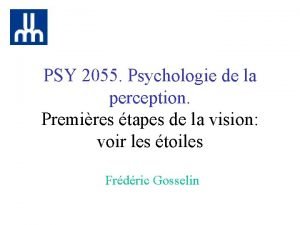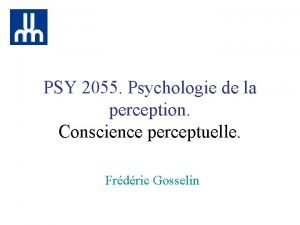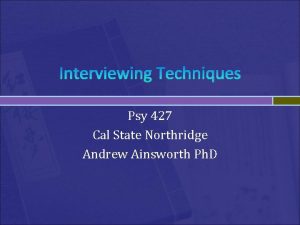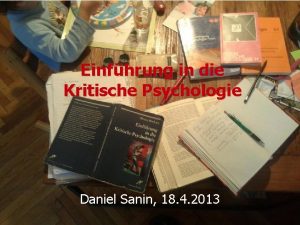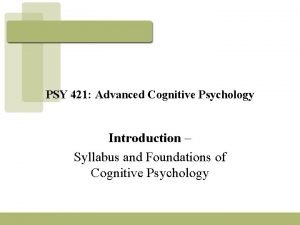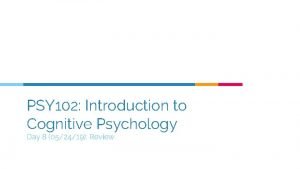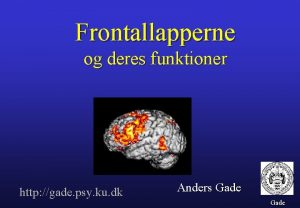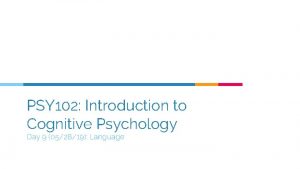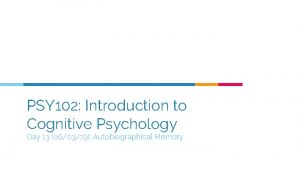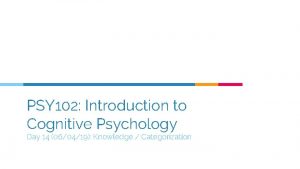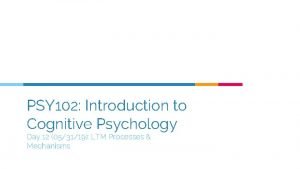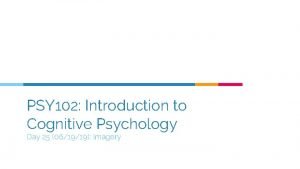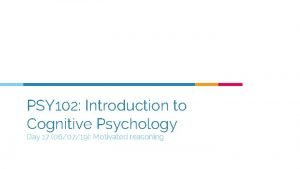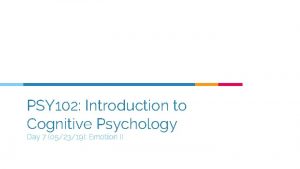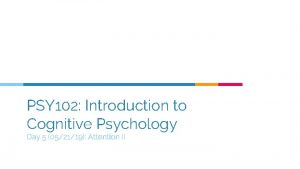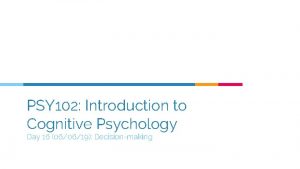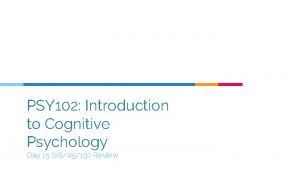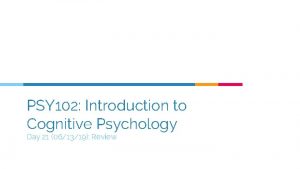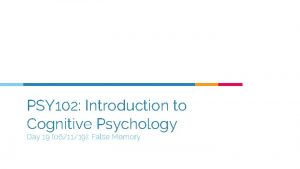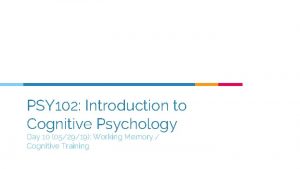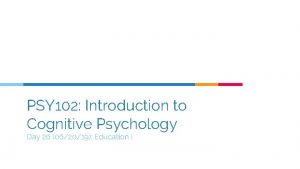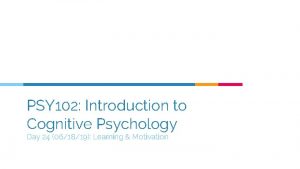PSY 102 Introduction to Cognitive Psychology Day 6


















- Slides: 18

PSY 102: Introduction to Cognitive Psychology Day 6 (05/22/19): Emotion I

Today’s Goals + Agenda 1. LO 1: Continue to build a supportive classroom culture & discuss science communication a. Paragraph-by-paragraph critique of 2 Sci. Am articles b. Group worksheets today on attention & emotion 2. LO 2: Apply principles of good science communication a. In minute paper, reflect on good/bad of podcast Sci. Comm b. Also discuss podcast in emotion paper 3. LO 3: Describe the basic fundamental principles of emotion research a. Group worksheet on emotion papers and podcast 4. LO 4: Summarize and critically analyze academic journal articles a. Group worksheets on attention & emotion

Course Changes ▷ Practice Quizzes (optional) ○ Checks for understanding ▷ Move around some of the material (order wise) ○ Change Friday to review + some other basic cog psych/neuro material ▷ Switch out some articles for occasional textbook chapter?

Quick Note ▷ Ignore sections like power analysis and MRI data & preprocessing: you don’t need to know those details ▷ DTI: diffusion tensor imaging - testing where water flows in the brain to get a sense of white matter structural tracts

Science Communication Paragraph-by-paragraph critique of 2 Sci. Am articles

Paragraph-by-Paragraph critique of Sci. Am articles: ▷ Are Our Scientific Heroes Too Heroic? ○ Revealing the struggles that lie behind ultimate success can motivate students better--from grade school to grad school ▷ How to Turn Failure into Success ○ Research reveals strategies for staying motivated in the face of challenges

Attention (Review & Discussion) Summarize and critically analyze academic journal articles & review content on attention research

Attention Handout ▷ Fill out the worksheet together in groups of 34 (2 groups of 3, 2 groups of 4) ○ I have the answer key

Emotion Describe the basic fundamental principles of emotion research Summarize and critically analyze academic journal articles

Writing Exercise Think about a memory you have that is especially (pick one): ▷ ▷ ▷ Joyful Serene/content Angry Disgusted Amused 1. 2. 3. 4. 5. 6. 7. What caused that emotion? What did your face do? What did you say/what noises did you make? What did it feel like in your body? What did it make you think, or focus on? What did it make you do? Do you think there was a job that emotion was supposed to be doing? Do you think it accomplished that job?

Why Study Emotion? ▷ Emotion directly modulates our cognition in numerous ways: ○ Negative memories are more likely to be remembered than positive memories ○ Fear can make you perceive time as slowing down and can make you attend to a gun but ignore everything else in the scene ○ Disgust can cause you to change the way you make your moral decisions, even when you don’t realize it

What are emotions? ▷ ▷ States that feel a certain way (qualia) States that motivate you to do something, particularly something of evolutionary/functional significance States that have associated physiological patterns States that signal to conspecifics (facial expressions)

What are emotions? “Emotion refers to a collection of psychological states that include subjective experience, expressive behavior (e. g. , facial, bodily, verbal), and peripheral physiological responses (e. g. , heart rate, respiration). ” - Gross & Barrett, 2011 ▷ Quick onset/duration (“minutes and seconds, not hours and days”)

Why Have Emotions? ▷ ▷ ▷ It’s useful to motivate certain behavioral patterns ○ Disgust: “I don’t want to touch that or eat it” It is important to prepare the organism for adaptive action ○ Fear: Pupils dilate ○ Anger: Blood to extremities It is important to signal to others ○ Panic/sadness: “I need help or nurturance” ○ Anger: “You betrayed me and I’m going to show everyone that there are consequences to betraying me” ○ Paul Ekman: Facial expressions are universal, and are there primarily to signal stuff to other people classic ( view)

Worksheet: what makes us have an emotion at a given moment? ▷ Different group than your attention worksheet group ▷ Fill out the worksheet together in groups of 3 -4 (2 groups of 3, 1 group of 4) ○ I have the answer key

Today’s Goals + Agenda 1. LO 1: Continue to build a supportive classroom culture & discuss science communication a. Paragraph-by-paragraph critique of 2 Sci. Am articles b. Group worksheets today on attention & emotion 2. LO 2: Apply principles of good science communication a. In minute paper, reflect on good/bad of podcast Sci. Comm b. Also discuss podcast in emotion paper 3. LO 3: Describe the basic fundamental principles of emotion research a. Group worksheet on emotion papers and podcast 4. LO 4: Summarize and critically analyze academic journal articles a. Group worksheets on attention & emotion

Tomorrow’s Work ▷ Readings: ○ d’Arbeloff et al. (2018) ○ Mac. Cormack & Lindquist (2018) ○ CNN & NPR articles (Chen & Strickland) ▷ Opening Paragraph (~100 words or less) of non-Duke article covered: ○ Mac. Cormack, Middlebrooks, Wechsler, Siegel, or Kang and Wheatley ○ Choose one that you haven’t already done

Participation & Minute Paper https: //tinyurl. com/PSY 102 Participation https: //tinyurl. com/PSY 102 Minute. Paper. May 22
